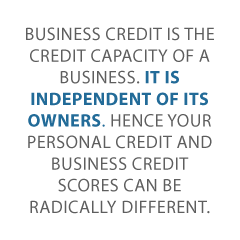Wondering How Long Does It Take to Build Business Credit?
If you need to know how long does it take to build business credit, then look no further.
This blog post may contain affiliate links, meaning when you click the links for some products and make a purchase, Credit Suite receives a commission at no additional cost to you.
What is Business Credit?
 Business credit is the credit capacity of a business. It is independent of its owners. Hence your personal credit and business credit scores can be radically different. Built correctly, business credit preserves your personal assets as they are never put on the line.
Business credit is the credit capacity of a business. It is independent of its owners. Hence your personal credit and business credit scores can be radically different. Built correctly, business credit preserves your personal assets as they are never put on the line.
But you must build business credit proactively – it doesn’t just happen.
How long does it take to build business credit? Business credit building is a process. But it doesn’t have to take forever. You may be seeing figures like three years thrown around. While it can be helpful to be in business for that long, you can build a good business credit profile and score long before that.
How Long Does It Take to Build Business Credit? The Truth is, Business Credit Building Process Needs to Be Faster
Three years really isn’t acceptable. According to the US Bureau of Labor Statistics, only about 60% of all businesses survive to celebrate their third anniversaries. For 4 out of 10 new businesses, three years is too late. Let’s make sure your business isn’t one of them. See bls.gov/bdm/us_age_naics_00_table7.txt
Speeding Up the Business Credit Building Process
This process is proven to work, so you won’t waste time on strategies which are unconfirmed. And you won’t get frustrated with avoidable denials and delays. Following the steps in order will also take advantage of building toward a goal, and it will give you actions to take while awaiting the passage of time. Because being in business for three years will be helpful! But you can act while those calendar pages flip.
Your Business Name
Yes, your business name matters! Keeping the name of a risky industry in your business name is only going to invite denials. A risky industry is generally one with more cash transactions than the norm, or there’s a high risk of injury on the job (to workers or even customers).
Gambling fits under the first definition, and construction fits under the second. There’s nothing misleading or unethical about calling your company X & Q’s rather than X & Q Construction. Everything stems from your business name, so start here.
Your Business Phone Number
Your business phone number will go on your website, your business cards, and all advertising. So it should be your second stop. Using a cell or residential phone could be problematic, particularly for retail establishments. So don’t do it.
Cell and residential phone numbers will generally get your business flagged as not being established. This could trigger denials. A separate phone number is vital. Fortunately, you can use voice over internet protocol (VOIP). That means you can have your business number ring any device, like your landline or cell phone.
Toll-free numbers are helpful for getting business and showcasing professionalism. These are 800 area code or the like. Your phone number also needs a listing.
Lenders, vendors, and other credit providers will be looking for your phone number, so will your prospects. So make it findable! You can get it on 411 by using ListYourself.net
Get a Proper Business Address
Just like your business phone number, your address will go on marketing materials, loan applications, and more. A residential address will get a retail establishment flagged as unestablished. The same is true if you use a UPS box or PO box.
You need a brick and mortar address. It has to be a place where mail can be delivered. Lenders, credit providers and more will check out your business on Google Street View. If they spot it’s a residential address for a retail business, then you could be inviting denials. And there’s no good reason to do so!
A virtual office is a great solution. It’s far less expensive than renting office space. So if you don’t need an actual office, it can work out rather well. Virtual offices are available in all 50 states and DC.
Here are three virtual office providers we love: Alliance Virtual Offices, Da Vinci, and Regus. You can buy packages which include clerical services, mail forwarding, the use of conference rooms, and more. Your business can look far larger than it truly is.
Your Business Website
Credit providers, vendors, and the like will be looking for your business online. A business website is a way you can control the narrative and put your best foot forward. Your business website is one place where the following will be listed: business name, address, and phone number. This is why we suggest squaring those away beforehand, it’ll save you time.
A professional website won’t just impress lenders and credit providers. It will also impress prospects and clients. A great website can help with sales even if you don’t sell online. It is a worthwhile investment to create a good one. Get help from a place like Upwork or Fiverr to get set up and have a logo made from a place like crowdspring.
Buy hosting from a provider like GoDaddy. This helps to further distinguish your business from amateurs and hobbyists.
Your Business Email
You want your business email to be on your purchased domain. Don’t use AOL, Yahoo, Gmail, or the like. Again, this separates your business from hobbyists and amateurs, in the eyes of prospects, customers, lending institutions, and more. Use a generalized email like [email protected] or [email protected].
This makes it easier for several people to work with the same email address, and you won’t have to change it if someone leaves your company.
How Long Does It Take to Build Business Credit? Account for Any Backlog at The Secretary of State’s Office
Every Secretary of State in the US keeps business information on its website. This can often include information on any grants or loans you may qualify for, now and in the future. You can get information on any licenses you need, and any continuing education you may need to keep those licenses.
Recognize that licensing takes varying amounts of time. The time to get a license also depends on your state. Some take a few days, others take weeks. Licensing isn’t just helpful to get and build business credit. You could be violating the law if you practice your profession without a license!
And proper licensing is something you can tout on your website and in your marketing materials, to help build your prospects’ confidence in your business.
Get a Business Bank Account
You need to keep your personal and business finances separate. Commingling makes taxes harder, and it could trigger an audit. Many starter vendors and other credit providers require that you have a business bank account.
Get a Merchant Account
It won’t help you build business credit. But you should still get a merchant account so you can take credit cards. Studies show people will pay more when they can pay with plastic. See consumeraffairs.com/news/report-shows-consumers-are-spending-more-with-plastic-instead-of-cash-111219.html
How Long Does It Take to Build Business Credit? The IRS Website Might Slow You Down
Your business needs an identification number (an EIN). Your company EIN is similar to your SSN in that it’s a unique identifier. An EIN is free and you get it during the same online session with the IRS. The IRS website is also where you select your codes.
There are both SIC and NAICS codes. SIC and NAICS codes show which kind of business you’re in. The IRS is moving from SIC to NAICS. But for now, consider both to be in play.
For example, 812320 means Dry Cleaning and Laundry Services (except Coin-Operated). If your business could fit under one or more code, choose the less risky code. Lenders and credit providers are far less likely to approve a business if they consider it to be risky. It’s the same principle as choosing your business name.
You choose codes at the same time as you get your EIN and select a business entity. The IRS is also where you choose your business entity.
Your business entity decides on taxes and liability in case of a lawsuit. Incorporating means business and personal affairs are truly separate. It’s really the only way to build true business credit. Deciding on an LLC, S-corp, or C-corp is up to you.
Work with a Corporate Lawyer
We highly recommend that you consult with a corporate lawyer to be sure of your options and make the best possible decision for your unique circumstances. And while you’re there, work with your attorney on drafting your Articles of Incorporation. Many Secretary of State’s offices will require that it be on file with them.
How Long Does It Take to Build Business Credit? Getting Your D-U-N-S Number from Dun & Bradstreet Can Sometimes be Slow
To build business credit, you must have a D-U-N-S number from Dun & Bradstreet. A D-U-N-S number + 3 or more reported payment experiences will generate a PAYDEX score. So you’ll have built business credit.
Establishing Payment Experiences
Your credit history is one of the main factors when lenders and credit providers determine creditworthiness. Making timely payments will show anyone looking to do business with your company that you’re low risk. You can open most credit accounts online in just a few minutes. To save time and frustration, you only want vendors which will report to the business credit reporting agencies.
Vendors Which Report Will Save You Time Building Business Credit
Most vendors do not report unless you’re late making your payments. But here are three that will also report when you’re paying on time or early: Marathon at www.marathonbrand.com, Uline at uline.com, and Grainger Industrial Supply at grainger.com.
Even these vendors may need you to reach a certain minimum spend before they will report. It can take over 30 days for reported purchases to show up on a business credit report. This is the case whether they are reporting a positive or negative payment experience.
Working with a Business Credit Builder Company
As you might imagine, these steps take time and attention. Hiring a business credit builder company means you’ll have time to do what you do best – run your business. Vendors and other credit providers change their requirements all the time. It pays to work with a company which specializes in business credit building and keeps track of such things, so you don’t have to.
Hiring a business credit builder company can be a big step. Let’s take the next step together.
How Long Does It Take to Build Business Credit: Takeaways
You can build a good business credit score and an enviable profile in half a year, not three years like many people think. Following the steps in order will assure the most speed, and the least frustration. On the way, you’ll build credibility in your business. This can lead to more sales. Be one of the 20% of all businesses which lasts 20 years or more.
Let us take the steps for you so you can concentrate on your business. It pays to work with a pro.

